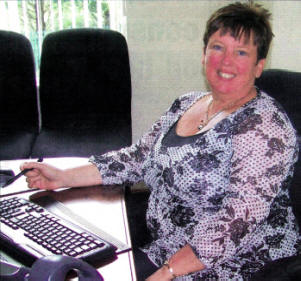
Senga McEvoy
 Jenny Monroe talks to Senga McEvoy, communications officer for NIE Distribution Centre.
Jenny Monroe talks to Senga McEvoy, communications officer for NIE Distribution Centre.
Lisburn's Senga McEvoy is Communications Manager for NIE's Distribution Service Centre based at the firm's headquarters in Craigavon. She is married to Gordon and has two grown up children, Stewart and Nicola, and has worked for NIE since she left school. Senga has been in her current role for the last six years.
Recently she has joined the ranks of Northern Ireland's Chartered Managers. She is the first woman from NIE to complete the qualification and one of only 30 people in Northern Ireland to attain the professional standard. As part of the process to attain Chartered Management status, Senga had to demonstrate how she had developed as a manager over the years of holding that position and to prove how she had applied her leadership and change management skills to achieve a demonstrable organisational impact.
I have a very varied role at work and no two days are the same. I come in with a whole list of things to do but I really never know what is going to happen and my plan can change very quickly depending if an emergency has occurred.
First thing I normally do is check my emails and then prioritise my day's work. I am responsible for the communications systems in the business and it is my job to investigate problems and speak to the telecoms and systems providers. Basically, if something isn't working I have to sort it out and make sure everything is up and running. The business is responsible for communicating with customers in relation to anything connected with their electricity supply except for their bills. Once a fault is logged at the call centre we will investigate the issue as quick as we possibly can.
It is all about effective communication between us and the customers. The minute electricity goes off we are expected to know what the fault is but occasionally we are unaware as a digger may have hit a power cable and until we are informed we don't know anything about it until loss of power is reported to us. We always endeavour to have it fixed as soon as possible and once we are aware of the problem then we can determine how long it will take to repair. This is the question that most customers want answered.
We operate a High Volume Call Answering system at our contact centre which is an interactive system that kicks in when the call operators are all occupied. This usually happens during a storm when we see a high volume of customers getting in touch to say their power has been affected. The interactive system is fantastic as it registers the customer's details and alerts us to their problem and also means that the customer does not have to wait in a queue to speak to an operator. It really is a good system and is not like an ordinary answering service — it is interactive and it helps us provide good customer service.
During an emergency situation I have to ensure that there are enough call agents and our systems are working and messages are being dealt with and information is being passed on to customers as quickly as possible.
Behind the scenes we also have emergency back up plan for all eventualities including not being able to operate from our headquarters. After 9/11 we had to think of a contingency operation we could employ if something terrible like that was to happen as we still need to be able to provide a service and relocate. Training is important in this job.
We have Duty Incident teams on a rota basis to deal with any emergency which means I am on call 24/7, 1 week in six but on a normal day, I do try to be home for 6pm. I am lucky to have such a supportive family who know that I am dedicated to my work. Before I leave I prepare a list of things to do the next day. I really enjoy my work and love learning and finding out new things. I love my job and the great environment that I work in.
Ulster Star
27/08/2010
